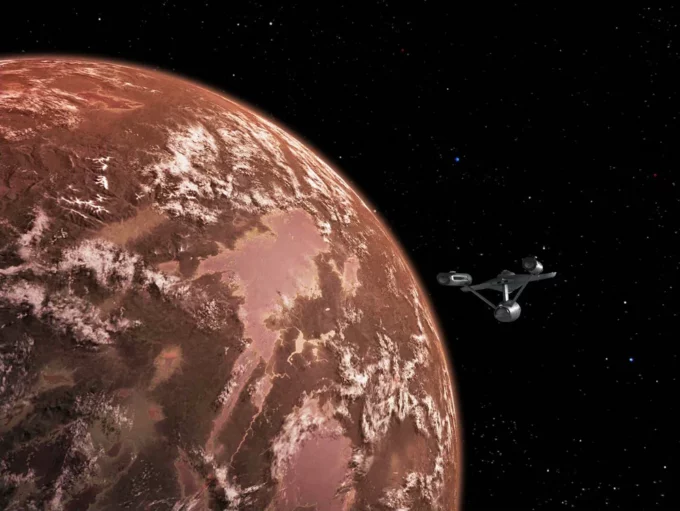
The Enterprise orbiting Planet Ardana in the Cloud Minders episode of Star Trek.
In my Star Trek class, I sometimes use some of the less commercially popular episodes, like “The Cloud Minders”, if they teach us about the problems of injustice and inequality in our society. In this episode Captain Kirk and Spock arrive on a Federation planet named Ardana to obtain a rare substance called xenite to combat a botanical plaque on another planet. From the beginning, when Kirk and Spock look in awe at the city floating in the clouds, Stratos, and are then attacked by Troglyte revolutionaries known as “the Disrupters”, we can see this planet is deeply divided, much like the former Apartheid regime in South Africa. In his 2021 article “’May We Become Greater: In Defence of Star Trek and Anti-Racism”, Professor George A. Gonzalez describes the oppressed Troglytes who work in the mines while the rich and educated artisans of Ardana live a blissful existence in Stratos, as “dark haired, dark-skinned and unwashed” (p. 20). The Stratos city dwellers Plasus and Droxine are stylishly dressed and appear to be of northern European descent.
Spock in particular is taken aback about how this system managed to evolve, and although he does not voice it, possibly how this unjust world managed to become a member of the United Federation of Planets. Professor Jose-Antonio Orosco says “’The Cloud Minders’ is unique among ST: TOS episodes because it contains one of the only occurrences of a Science Office Log by Mr. Spock, rather than a Captain’s Log by Kirk, to provide context. In the voice-over, Spock surveys the conditions of Stratos, providing us an opportunity to understand the historical oppression on Ardana. Using Galtung’s triangle, we can better appreciate the narrative about violence that this episode proposes. On Ardana, the main form of oppression seems to be exploitation. Spock observes: ‘This troubled planet is a place of the most violent contrasts. Those who receive the rewards are totally separated from those who shoulder the burdens. It is not a wise leadership.’ Spock also notes that it is this structural violence that is driving the anger of the Disrupters: ‘The young girl who led the attack against us when we beamed down was filled with the violence of desperation.’”(pp. 76-77)
Although the “girl”, Vanna, is a full-grown woman, it is very impressive to me that a program from the 1960s would have a woman as the leader of a revolutionary movement that threatens to destabilize the status quo on the planet. Perhaps this is so because the writer, Margaret Armen, was also a woman. In any case, it would have been highly progressive even on a series that was so liberal in so many other ways, but where Earth women cannot command starships! Blame the network executives for that kind of sexism.
Professor Orosco continues: “Moreover, as the episode progresses, we witness the powerful way in which cultural violence has shaped the minds of the Stratosians to the point that they do not even recognize the injuries they inflict. Droxine, Plasus’s daughter, tells Kirk and Spock that Troglytes must live on the surface because they cannot physically bear the sunlight in the clouds and their minds are not evolved enough to engage in artistic and intellectual pursuits. Obviously, the young Stratosian elite have grown up with accounts that justify the relative social positions of Ardanians as grounded in natural evolutionary processes—something that Dr. McCoy reveals is entirely false. So completely is the hold of cultural violence on Droxine that she experiences no cognitive dissonance as she explains to Kirk and Spock how Stratos has completely eliminated violence, and in the next moment she assists her father in torturing Vanna. When Kirk and Spock protest and intervene on Vanna’s behalf, Droxine scoffs and suggests that physical coercion is the only way to make Troglytes understand urgent matters. Spock replies that they can understand and are due what all other humanoid species require: to live with equality, kindness, and justice.” (p. 77)
Finally, “Plasus assures them such concepts don’t apply to the Troglytes, not only because they could not understand what they mean but because the Troglytes are simply not worthy of protection from violation: ‘Troglytes are not like Stratos dwellers, Mr. Spock. They’re a conglomerate of inferior species. The abstract concepts of an intellectual society are beyond their comprehension.’” (Ibid.)
Despite this, Kirk uses creative diplomacy to get the zenite in time, and at the end we see that negotiations between the Troglytes and Stratos may soon begin. As Vanna puts it, “Our demands have just begun.” The question now I would like you to consider is will our society, which already has tremendous inequality and a legacy of slavery and racism, become like Ardana? We don’t have floating cities yet, but we do have gated communities for the super wealthy, where the elites have no contact with the workers, save the household laborers they employ. Let’s hope we can learn something from this underrated episode of Star Trek about what not to do in the future!
As for the brief flirtation between Spock and Droxine, Marc Cushman notes that was not the work of Margaret Armen; “The offending material was added by [producer Fred] Freiberger and [script editor Arthur] Singer after [Robert] Justman’s departure and after Armen completed her final polish on the script.” (p. 983) Spock is simply incapable of this kind of admiration for a woman except during Pon Farr, but leaving that irritant aside, this episode deserves a wider audience among the fans, and maybe even those elites in their mansions.
NOTES
George A. Gonzalez “’May We Become Greater’: In Defence of Star Trek and Anti-Racism”, Foundation: The International Review of Science Fiction, Volume 50.1, Number 138, 2021, pp. 14-22.
José-Antonio Orosco. Star Trek’s Philosophy of Peace and Justice. Bloomsbury Publishing. Kindle Edition.
Marc Cushman; Susan Osborn. These Are the Voyages – TOS: Season Three (These Are The Voyages series Book 3). Kindle Edition.